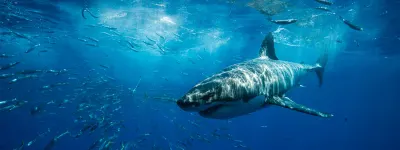According to The Guardian, a new study has found evidence to suggest the absence of sharks can worsen the effects of extreme climate damage.
The study was conducted by a research team from Florida International University (FIU), the University of Washington and Deakin University in Australia. “We wanted an answer to the question: can the absence of large predators exacerbate climate change effects?... Can it cause an already bad situation to spiral downwards?” said Rob Nowicki, lead author and a research affiliate at Mote Marine Laboratory, who conducted the study as a PhD student at FIU.

The study centred around one of the world’s “largest and most biodiverse seagrass meadows”, located in Shark Bay, Western Australia. An existing study detailed how the bay’s tiger shark population altered the feeding habits of grazing animals such as turtles and dugongs, leading to less destructive feeding patterns. But, following a marine heatwave in 2011, which destroyed one quarter of the seagrass canopy and caused the dugong population to temporarily disband, the researchers saw a unique opportunity.
Published in the Journal of Animal Ecology, the paper details how the scientists used the new heat-resistant seagrass beds - now growing in the damaged part of the bay - as a laboratory. Mimicking the grazing rate of dugongs when the threat of sharks is absent, scuba divers raked and removed freshly-grown seagrass in typical grazing patterns. “This allowed us to mimic the behaviour dugongs would have if the sharks in the bay magically disappeared, or were overfished,” said Nowicki.
As a result, the main seagrass canopy didn’t recover. This suggests that, when apex predators disappear, the increased grazing of herbivores makes it difficult for ecosystems to recover from the effects of extreme climate damage.
“It is likely this is happening in places that did not have 15 years of study and did not have this climate event,” said Nowicki. “We are making the case that protecting predator species and keeping these species relationships can actually lead to resilience to these events.”




